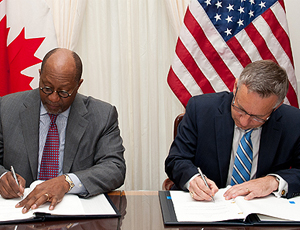
The U.S. and Canada have agreed to a two-year extension of a 2006 trade pact that governs pricing and export volumes for softwood lumber, a key material in housing construction.
The extension, which top trade officials from the two countries signed in Washington, D.C., on Jan. 23, carries the lumber agreement through Oct. 12, 2015, but does not otherwise change the 2006 pact.
U.S. Trade Rep. Ron Kirk said the lumber agreement “is very important for U.S. producers, particularly when both sides of the border are facing week demand.”
Ed Fast, Canada’s minister of international trade, called the new agreement “great news for Canadian lumber workers and their families.” He added that the extension “will bring much-needed stability and predictability to the lumber industry.”
The signing of the extension came just five days after President Obama delivered some disappointing news to Canadian Prime Minister Stephen Harper: Obama had rejected a permit application from Calgary-based TransCanada to build an oil pipeline from Alberta to the U.S. Gulf Coast. Harper's administration supported the project.
When Obama called Harper to notify him about the decision on the Keystone XL pipeline, Harper “expressed his profound disappointment with the news,” according to a statement released by the prime minister’s office.
The 2006 agreement ended a long-running dispute between the two countries over lumber pricing. Under that pact, the U.S. halted antidumping and countervailing duties on imported Canadian lumber and refunded to Canada more than $4 billion of the estimated $5.3 billion in duties the U.S. had collected since 2002.
For its part, Canada agreed to impose charges and shipment limits on lumber it exports to the U.S. when prices dip below certain benchmarks.
The agreement also provided that an independent organization—the LCIA, formerly the London Court of International Arbitration—would be responsible for settling U.S-Canada lumber disputes.
Since the agreement took effect in October 2006, the court has issued decisions in two such cases, both brought by the U.S.



Post a comment to this article
Report Abusive Comment